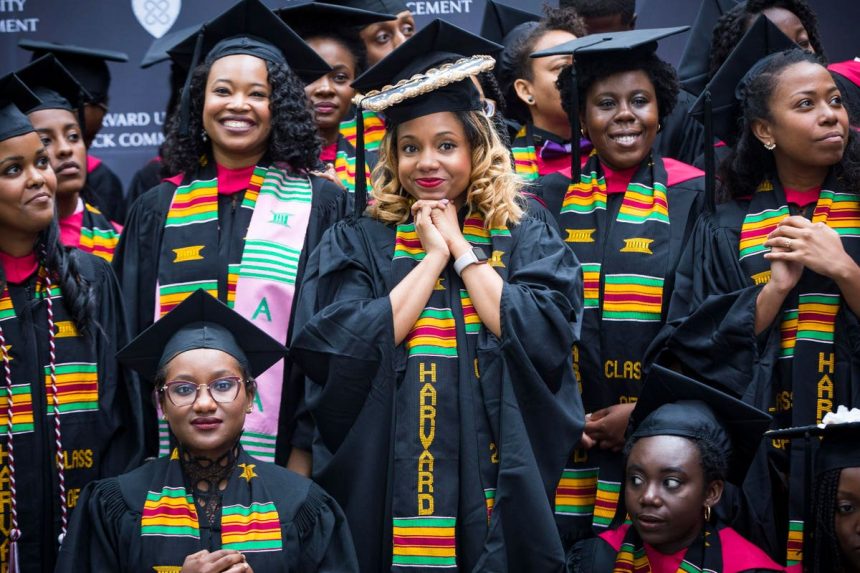The U.S. Supreme Court has ruled race-conscious college admissions policies and practices unconstitutional. Affirmative Action opponents have long argued that admitting presumably unqualified applicants of color to highly-selective institutions sets those students up for failure because they can’t do the work. If completing a bachelor’s degree is a reasonable measure of whether someone has what it takes to succeed in the Ivy League or at another highly-selective university, then federal data from the three institutions where admission slots are among the most coveted in the world confirm that Black students are indeed more than capable and deserving of the opportunities they earned.
My analysis of statistics from a publicly-available U.S. Department of Education database reveal that six-year graduation rates (a commonly-used metric in higher education) for Black students are higher at Harvard and Princeton than they are for the overall student body. At Harvard, it’s 98% for undergraduates overall and 99% for Black collegians. It’s also 99% for Black students at Princeton, compared to 97% of bachelor’s degree seekers there overall. Additionally, 98% of Yale students graduate within six years – the percentage is the exact same for Black Yalies.
Brian Peterson, a Black man, earned a bachelor’s degree in engineering as well as a master’s degree and a Ph.D. in education, all from the University of Pennsylvania. “Nothing about these graduation rates surprises me,” says the three-time Ivy League graduate who now directs Penn’s Black Cultural Center and teaches in Africana Studies and Urban Studies. “Black students understand the landscape when they apply, they build community, and they tap into their resources. They’ve also had to prove their brilliance time and again, and are aware that they’re representing more than themselves.”
Princeton, Yale, and Harvard aren’t the only highly-selective institutions that have achieved similar results. At Cal Tech, 100% of Black students graduated in the most recent cohort for which data are available, compared to 94% of students overall. The University of Chicago, Johns Hopkins University, Case Western Reserve University, and Wake Forest University are other highly-selective privates from which Black students have graduated at higher rates.
Additionally, graduation rates are exactly one percentage point lower for Black undergraduates than for students overall at Columbia University, NYU, Emory University, Vanderbilt University, and Boston University. For private institutions ranked among U.S. News & World Report’s Top 20 National Universities, the average graduation rates are 93% and 95%, respectively, for Black collegians and for students overall.
DeAngela Burns-Wallace is a Black woman who’s earned a bachelor’s degree from Stanford, a master’s from Princeton, and a doctorate from Penn. She also spent five years as Stanford’s Assistant Dean of Undergraduate Admission, and now serves on the University’s Board of Trustees. Her doctoral dissertation was on the racialized experiences of professionals of color who work in college admissions offices. She’s one of our nation’s most respected college access leaders.
“It is critical to understand that highly-selective institutions recruit students who not only excel academically, but also demonstrate intellectual curiosity, leadership, and bring rich perspectives,” Burns-Wallace notes. “This is true of everyone they admit, including students of color. These particular institutions are good at holistically identifying the best, brightest, and next generation of thinkers from diverse backgrounds.” Given this, Burns-Wallace says she isn’t at all surprised that Black undergraduates complete degrees at rates that exceed or are comparable to their peers from other racial groups at highly-selective universities.
“These numbers support what many admissions professionals and social scientists know about elite selection: that many minoritized applicants come with skills, dispositions, and attitudes that make them more successful, not less, than the average applicant,” contends University of Southern California Professor Julie Posselt, author of an acclaimed Harvard University Press book on graduate admissions. “We see this in education and the labor market alike,” Posselt adds.
Alta Mauro, Harvard’s Associate Dean for Inclusion and Belonging, knows firsthand that Black students who are admitted there can and almost always do succeed – they just have to be afforded the opportunity. “It is important to differentiate between a competence gap and an opportunity gap,” she insists. “To say that Black people are less capable of thriving academically is an oft-refuted falsehood. Being expected to overcome opportunity gaps is a reality for too many Black students, and a reflection of racial and economic inequities that are uniquely American.”
It’s worth noting that most undergraduates at Yale, Harvard, Princeton, and other highly-selective private research universities graduate within four years. There possibly could be racial inequities in four-year graduation rates at some of these schools; the federal database I used for this article reports six-year bachelor’s degree attainment numbers, which is the widely-accepted standard in higher education research and policy analyses. Regardless of whether it takes them three, four, five, or six years to complete, millions of Black students have proven that they are absolutely capable of succeeding in classrooms and graduating from elite institutions.
Read the full article here





